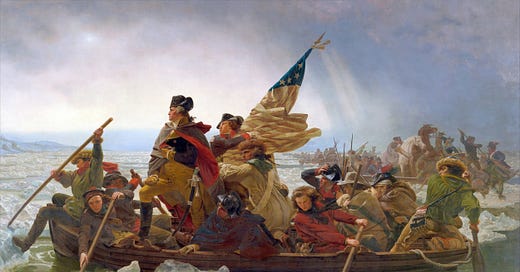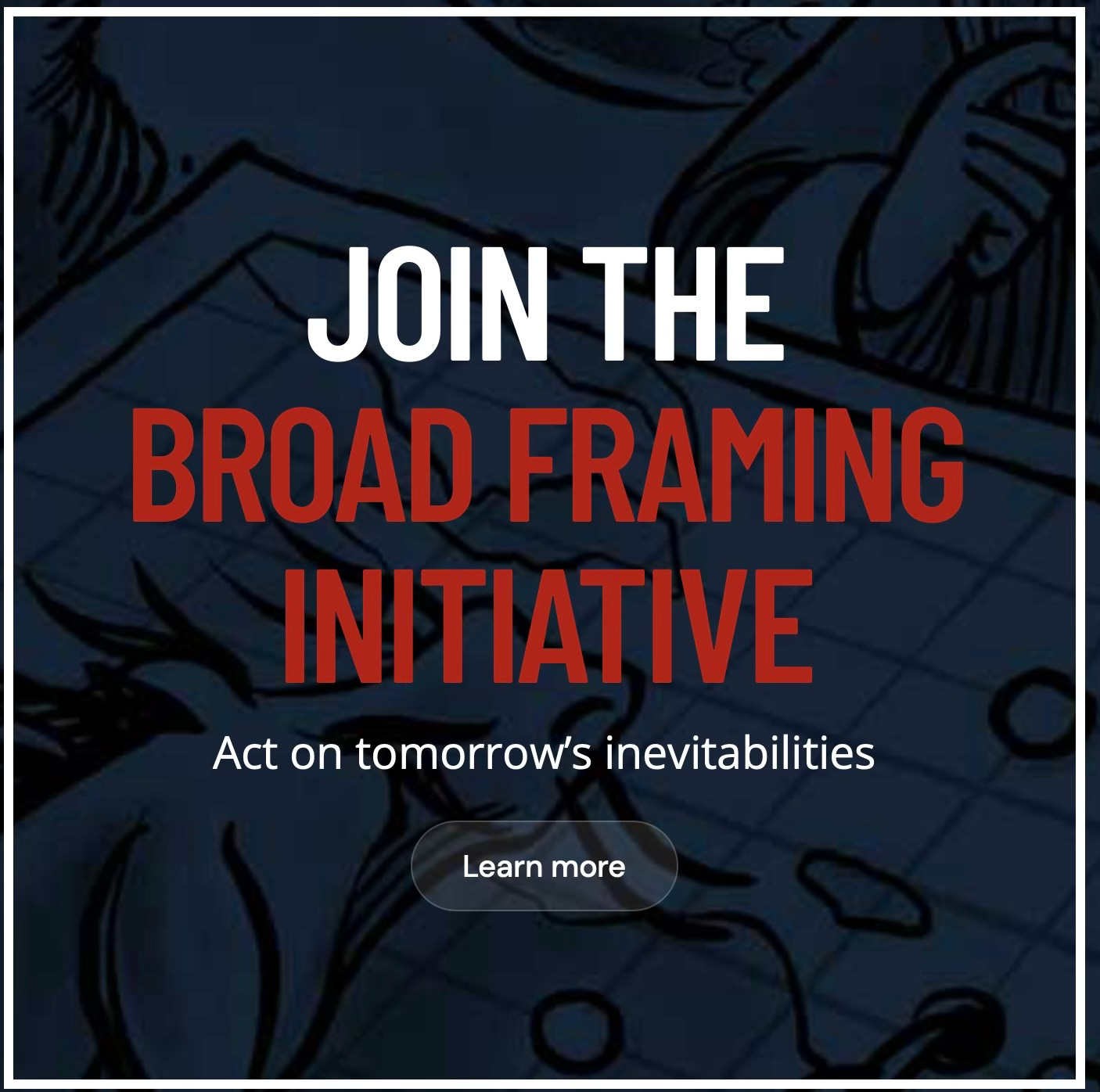This is a reader-supported publication. I give it all away for free but could really use your support if you want me to keep doing this.
Understand where I’m coming from: Americanism is my religion and my identity. It is the primary means by which I exert my personal influence over the world while serving that world’s best interests.
I believe the same to be true for all Americans: none of us have an identity that is more consequential for human history than our identity as Americans, because no other nation has or will shape humanity’s future more than we.
Having said that, national identity is a very complex concept often mistakenly defined along simplistic lines. America, as a synthetic society blending our hemisphere’s original peoples with those of the Eastern hemisphere over the centuries, is the most advanced “civilization” in our world today not because of our history (shorter than most) or because of our sheer power but because of our blended identity — our sheer mongrelization, if you will. We are the place where Africans and Europeans and Asians came together to form a unique civilization in tortuous concert with the indigenous populations.
So, yes, the West is the best on the basis by our being farthest along in this necessary evolution — this blending that scares the crap out of a strong subset of our population (i.e., MAGA specifically and White Christian Nationalism generally).
Which gets me to today’s subject …
War has always played a central role in shaping and defining national identity. It is the prototypical origin story. As such, it profoundly influences how citizens perceive themselves, their history, and their collective purpose.
America’s Revolutionary War fundamentally transformed how we Americans saw ourselves and our nation. Prior to the Revolution, colonists identified with their individual colonies or regions. Their shared struggle against British rule birthed a national identity as "Americans" (new concept) rather than Virginians, etc.
Later, the US Civil War took that larger identity definition up a notch — elevating it from sectionalism (North v South v West) and birthing a truly continental identity.
Later still, our war with Spain announced America’s new identity as a world power, and then the two World Wars established us as the leader of the Free World.
With the collapse of the Soviet bloc, our sense of identity ballooned further, whether we realized it or not. The world saw globalization as an Americanization phenomenon (and we often assumed that it was — see our profound disappointment in China remaining Chinese to this very day!). We swallowed that maximalist Kool-Aid in our pursuit of the Global War on Terror — as in, to preserve our identity was to defeat virtually all other civilizational identities.
Whew! No wonder we got exhausted!
Despite all the wars between 1776 and today, Americans still draw upon that original revolutionary experience for our core values — particularly the right to self-governance as defined by the Constitution produced by that successful war. That fight, as hard and as long as it was (eight years we fought the Brits! and then had to do it all over again in 1812!), produced a mythical narrative of sacrifice and patriotism that lingers today in deep ways.
I proposed to my wife at Boston’s North Church. Why? She was a big Paul Revere fan — over 200 years later. That’s the essence of a national memory: it validates who you are, where you fit in, who's your tribe. It’s not corny; it’s a natural pride and feeling of connection over time.
No, our revolution did not lift all boats. Colonists were just as united in their resistance to the British Crown as they were in their sense of superiority over the continent’s non-White populations (enslaved Africans, Native Americans, Latinos), and so further “revolutions” were necessary (Mexican War to grab most of the West, Civil War on slavery, our rather genocidal settlement of the West).
On many levels, these struggle continue til this day. Across my lifetime, I, like all of you, have had my American identity shaped by various actual wars (Vietnam, Global War on Terror) and quasi wars (Civil Rights movement, women’s liberation movement, the fight over abortion, gay rights, etc.). We are constantly struggling with our national identity as a military power of great consequence in world affairs, as well as struggling with our individual identities as citizens with shared rights.
These struggles are highly divisive. Externally, we debate whether or not we stand with Ukraine. How much can we stand from Israel on Gaza? But then do we stand with Israel against Iran? Are we actually going to fight China over Taiwan?
But then, internally, we also debate the question of who's a “real” American. Those wires cross over in things like anti-Semitism on college campuses, abortion rights in State A versus next-door State B, the question of birthright citizenship, the whole universe of issues surrounding the rights of undocumented people who have made their homes within our borders — almost all of which were decided by some war (to include our Louisiana Purchase from a war-depleted France — as in, thank you war-mongering Napoleon!).
Saturday presented an implicitly stark clash of these images and identities: a big military parade in Washington (celebrating all those wars we won) versus all those “No Kings” demonstrations across the country. Both gatherings essentially celebrated the same origin story (our Revolution) but from very different angles, yes?
Wars, as a rule, force societies to reassess their values and priorities, like how our Civil War redefined our sense of Union and the fundamental nature of citizenship (the end of slavery, birth right citizenship).
More generally, wars legitimize the very notion of an individual nation-state: This is where and who we are because we fought for this land. As such, these conflicts present a flip-side to that identity coin by defining who’s not on our side — a dynamic we now often diagnose as “ethnic cleansing” (as in, you’re not wanted here; you have to go for our identity to be preserved).
America was built on ethnic cleansing — from the start. That’s a tough history to swallow, but to deny it is self-delusion.
For America to become America was to drive off Native Americans and Mexicans, along with any intervening world powers (Spanish, French, Brits), so we could claim our continent to the fullest extent possible (along with toying with the idea of grabbing Canada at various points in our history).
Today, for America to remain/regain?/reclaim? America, we must fight for … what exactly? Recognizing the full complexity of gender identities and sexual orientations? Or just drive off as many Latinos as necessary to repel their “invasion”?
All this conflict and struggle and declared “wars” over my lifetime and — yet — I’ve never lived through an actual declaration of war. The last time America formally declared war was in 1942 against the Axis powers of Hungary, Bulgaria, and Romania. If you accept the tyranny of that listing, then Romania — of all states (!) — remains the last nation on earth to serve as opponent in a US-declared war.
Kind of odd, when you think of it.
But here’s the bigger danger than we encounter today: when war becomes central to identity, societies may be more likely to glorify conflict or see it as inevitable, perpetuating cycles of violence.
It doesn’t take all that much for the entire world to be perceived as being “on fire,” not with modern media coverage and network transparency.
Israel is a case in point. Russia is a case in point.
Both states are coming to view non-stop war as essential to their identities — as in, Gaza and the West Bank must be erased, Ukraine must be erased.
Same fear attaches to China: Taiwan must be erased.
Then look back over here in the Western Hemisphere, with our loose talk of simply snatching Greenland or “breaking” Canada to the point of reducing it to our 51st state. Are these necessary steps to preserving our national'/global identity?
People are asking, alright.
All these conflicts are stirring deep questions about our identity as Americans and as a world power: Do we need to take back the Panama Canal? Do we need to expel those “invading” Latinos? Do we retreat behind a Golden Dome or are we in fierce competition with China to wire up the Global South? Or do all of the above apply?
Down which paths do our truest identities lie? And must those identities always match up with a preferred racial identity (White) and a preferred religious identity (Christian)?
As a parent to two Millennials and four Gen Zs, I am often perplexed by their shape-shifting tendencies — their sheer ability to embrace and accept a very wide and discriminating patchwork of identities in their daily lives. It confounds me, and, by doing so, makes me nervous.
A lot of my generation (Boomers) view these tendencies as weakness or lack of focus or just a general wishy-washiness that is offensive in its self-indulgence.
I am coming to see it as their coping superpower — in addition to marking the way ahead in a complex world facing radically advancing definitions of connectivity, privacy, free will, omniveillance, etc. I see the Millennials and Zs as far more flexibly ready for the identity challenges of this shared future, particularly as the world is stressed by demographic collapse in the Global North and climate being ravaged across the Global South.
I am beginning to view a lot of the identity definitions of Boomers and Xers as being poisonously outdated in a digitalized world that must increasingly be led and defined by digital-native generations.
No, I don’t think the kids are alright — right now. But I do believe they will set things right, when given the chance.
And I base a lot of my hopeful identity — to include, quite saliently, my self-definition as a father — on those ascending generations.
POSTSCRIPT: I wrote this on Father’s Day, a holiday I hate as the father of six (three by birth, three by adoption).
I hate Father’s Day because, to me, it seems like one giant guilt trip reminding me of the profound responsibilities I bear as a father to now seven human lives. The date also corresponds to the worst of my allergy suffering and my phobias concerning insect invasions of my home. As such, I consider this holiday the very lowest point of my calendar year.
But, you know what? That’s where you find your truest identities because you need them most then.
And so I feel recommitted to the struggle, as well as to my sticking around and playing my part for as long as I can possibly manage.






